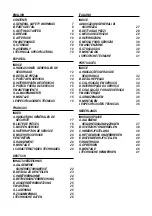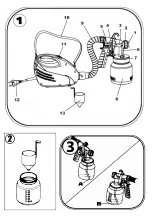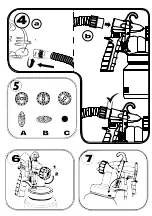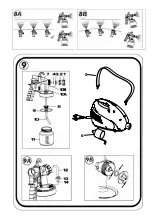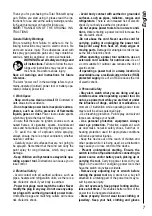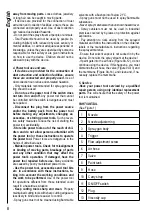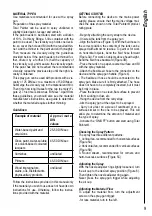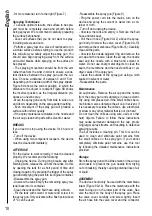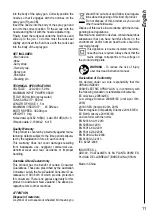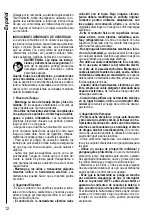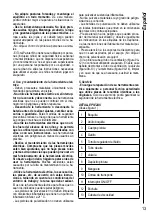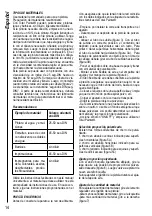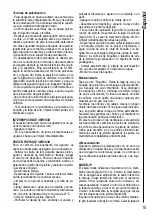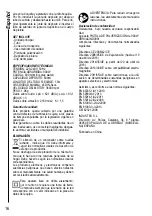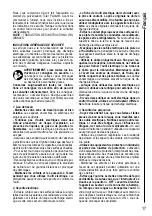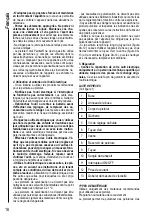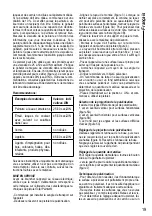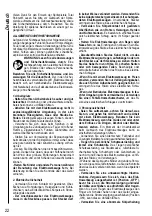
English
Thank you for purchasing the Total Painter® spray
gun. Before you start using it, please read the ins-
tructions for use and all the safety warnings carefu-
lly. Keep this manual on hand for future use.
NOTE: TRANSLATION OF THE ORIGINAL INS-
TRUCTIONS
General Safety Warnings
Errors resulting from failure to adhere to the fo-
llowing instructions may lead to electric shock, fire
and even severe injury. The substances used with
this spray gun (solvents, paint, etc.) may contain ha-
zardous, harmful, explosive or corrosive materials.
WARNING Read all safety warnings and
all instructions. Failure to follow the war-
nings and instructions may result in elec-
tric shock, fire and/or serious injury.
Save all warnings and instructions for future
reference.
The term “power tool” in the warnings refers to your
mains-operated (corded) power tool or battery-ope-
rated (cordless) power tool.
1. Work Space
- Keep work area clean and well lit. Cluttered or
dark areas invite accidents.
- Do not operate power tools in explosive atmos-
pheres, such as in the presence of flammable
liquids, gases or dust. Power tools create sparks
which may ignite the dust or fumes.
- Ensure that there are no ignition sources such as
naked flames, lit cigarettes, sparks, incandescent
wires and hot surfaces during the spraying process.
- To avoid the risk of explosion while spraying,
always ensure there is proper ventilation, whether
natural or artificial.
- Carefully cover all surfaces that are not going to
be sprayed. Remember that the wind can carry the
paint spray for long distances, which may cause
damage.
- Keep children and bystanders away while ope-
rating a power tool. Distractions can cause you to
lose control.
2. Electrical Safety
- Avoid contact with all earthed surfaces, such as
pipes, heaters and refrigeration units, as there is a
risk of electric shock if your body is earthed.
- Power tool plugs must match the outlet. Never
modify the plug in any way. Do not use any adap-
ter plugs with earthed (grounded) power tools.
Unmodified plugs and matching outlets will reduce
risk of electric shock.
- Avoid body contact with earthed or grounded
surfaces, such as pipes, radiators, ranges and
refrigerators. There is an increased risk of electric
shock if your body is earthed or grounded.
-Do not expose power tools to rain or wet condi-
tions. Water entering a power tool will increase the
risk of electric shock.
-Do not abuse the cord. Never use the cord for
carrying, pulling or unplugging the power tool.
Keep cord away from heat, oil, sharp edges or
moving parts. Damaged or entangled cords increa-
se the risk of electric shock.
-When operating a power tool outdoors, use an
extension cord suitable for outdoor use. Use of
a cord suitable for outdoor use reduces the risk of
electric shock.
-If operating a power tool in a damp location is
unavoidable, use a residual current device (RCD)
protected supply. Use of an RCD reduces the risk
of electric shock.
3. Personal Safety
- Stay alert, watch what you are doing and use
common sense when operating a power tool. Do
not use a power tool while you are tired or under
the influence of drugs, alcohol or medication. A
moment of inattention while operating power tools
may result in serious personal injury.
- Use breathing protection. Paint spray and solvent
fumes can damage your health.
- Use personal protective equipment. Always
wear eye protection. Protective equipment such
as dust mask, non-skid safety shoes, hard hat, or
hearing protection used for appropriate conditions
will reduce personal injuries.
- Keep this device out of the reach of children and
other people while it is being used, as a distraction
may cause you to lose control of the device.
- Prevent unintentional starting. Ensure the
switch is in the off-position before connecting to
power source and/or battery pack, picking up or
carrying the tool. Carrying power tools with your
finger on the switch or energising power tools that
have the switch on invites accidents.
- Remove any adjusting key or wrench before
turning the power tool on. A wrench or a key left
attached to a rotating part of the power tool may re-
sult in personal injury.
- Do not overreach. Keep proper footing and ba-
lance at all times. This enables better control of the
power tool in unexpected situations.
- Dress properly. Do not wear loose clothing or
jewellery. Keep your hair, clothing and gloves
7



